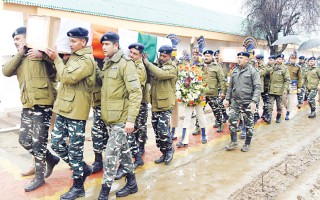Seven more killed in Indo-Pak shelling
Tensions between India and Pakistan raged Saturday as heavy firing by their armies killed at least seven people on either side of their fiercely disputed Kashmir border.
The nuclear-armed rivals fired mortars and artillery at each other despite the release of an Indian pilot who had been shot down by Pakistan but then sent back as a ‘goodwill gesture’.
In a fearsome 24 hour spell, two soldiers and two civilians died on the Pakistan side, its military said. On the Indian side, a woman and her two children died after their house was pulverised by a mortar shell.
Indian army chief Bipin Rawat dashed to Udhampur in his country's sector of Kashmir on Saturday to review border security.
Across the region villagers huddled in makeshift bunkers while police ordered non-essential traffic off roads, an AFP reporter said.
In a sign of the unease, residents say they are afraid another conflagration is likely.
‘The way situation is developing along the LoC makes me feel that both sides may collide head-on anytime now,’ said Chaudhry Jahangir , a Pakistani resident of the Samahni sector in Kashmir, reports Reuters.
At least 12 civilians have been killed on either side of the frontier since the start of the week.
The release of Wing Commander Abhinandan Varthaman to Indian authorities late Friday following 60 hours in Pakistani custody boosted hopes of a de-escalation.
But a furious backlash erupted in India over a video in which Abhinandan can be seen praising his captors and criticising Indian media.
Abhinandan was shot down in his MiG fighter Wednesday as he chased Pakistani jets over disputed Kashmir. His capture had become the centrepiece of hostilities between the arch-rivals after a February 14 suicide bombing in Kashmir killed 40 Indian paramilitaries.
Abhinandan, who ejected to safety but was set upon by a crowd on the Pakistani side of the Kashmir ceasefire line, had a noticeable black eye when he returned and was immediately taken for a medical checkup before a debriefing by military and intelligence agencies.
Media reports said Abhinandan’s return was held up because he was forced to make the video before being freed.
In the heavily edited video distributed by the Pakistani military just before his release, he praised the professionalism of the Pakistani army and criticised Indian media for creating war hysteria.
There was no let-up in war rhetoric with Indian prime minister Narendra Modi saying no-one could ‘dare threaten’ a ‘new, fearless and decisive’ India.
Modi also told an India Today media group conference the country needed the Rafale fighter jets it wants to buy from France. The deal has been embroiled in corruption allegations levelled by the opposition Congress party.
‘If India had the procured the Rafale on time then the result of the recent skirmish with Pakistan could have been different,’ Modi said.
In a bid to defuse the tensions, Adel al-Jubeir, minister of state for foreign affairs for Saudi Arabia, a key Pakistan ally, was to arrive in Islamabad Sunday, underlining global concern over the showdown.
Saudi Arabia has offered to help to end the new hostilities.
‘He is visiting us and will also visit India. He is our friend and we have historical relations with them (Saudi Arabia),’ Pakistan's foreign minister Shah Mehmood Qureshi told reporters.
Pakistan’s foreign minister Shah Mehmood Qureshi said the country had acted with prudence in releasing the pilot.
‘There was no pressure on Pakistan to release him nor any compulsion,’ he told BBC Urdu.
‘We wanted to convey to them that we do not want to increase your sorrow, we do not want to mistreat your citizens, we just want peace.’
Pakistan media praised the government for releasing the pilot, with lawyer Shahzaib Khan writing in the Express Tribune that prime minister Imran Khan had ‘done Pakistan proud by not engaging in chest thumping or war-mongering for political gain.’
India accused Pakistan of harbouring the Jaish-e Mohammad group behind the attack, which Islamabad denied, and prime minister Narendra Modi promised a strong response.
Indian warplanes carried out air strikes on Tuesday inside Pakistan on what New Delhi called militant camps. Islamabad denied any such camps existed, as did local villagers in the area, but Pakistan retaliated on Wednesday with its own aerial mission, that led to both sides claiming to have shot down jets.
The standoff came at a critical time for Modi, who faces a general election that must be held by May and who had been expected to benefit from nationalist pride unleashed by the standoff.
Pakistani leaders say the ball is now in India’s court to de-escalate the tensions, though the Pakistani army chief told top military leaders of the United States, Britain and Australia on Friday that his country would ‘surely respond to any aggression in self-defence’.
News Courtesy: www.newagebd.net











